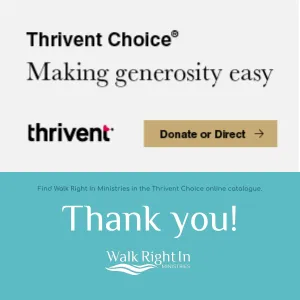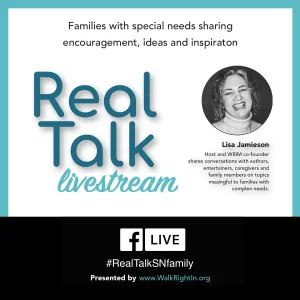
This is Part 3 in our series and Respite Rhythms and another installment in the ongoing discussion about the 8 Habits of Caregivers with a Robust Support System. Today, I’m sharing some “pro tips” for you to consider. These ideas have been gathered from personal experience and numerous conversations with other family caregivers throughout over 20 years in ministry.
NOTE: Let me apologize, in advance: this is another long post. This subject is close to my heart, so I’ve had a lot to say about it. Rather than break it up into an even longer series, it seemed important to drop it out here in virtual land and let you digest it at your own pace. Hah! See what I did there? 😉
If you are the parent or other family caregiver of a loved one with disabilities, you will understand the scarcity of things like rest, discretionary time, spiritual retreats, or even spontaneous intimacy in the marriage bed. It may not be possible to get the frequency or nature of breaks you hope for. But it is possible to achieve an adequate rhythm of respite and find a reasonably balanced pace of refreshing activities.
In fact, it is essential for caregivers to achieve some reasonable balance in this area. Without it, we are at risk of things like bitterness, burnout, and breakdown. Adequate respite rhythms keep us resilient in the short term and sustainable for the long haul.

Make trusting God the foundation of your respite planning.
At Walk Right In Ministries, we’re big cheerleaders for people learning to walk in faith. We understand that it often starts with just a tiny bit of confidence or a sense of God’s prompting to start in a right direction by taking one single step toward trusting God.
A first step may be to set a date. You may not even know what you’re going to do with the time yet. Another approach is to be on the lookout for activities of interest. You may have noticed an upcoming event that would bring you joy (e.g., Christmas concert). Sometimes the first step will be identifying something you aspire to do (a destination you’ve always wanted to go, a new restaurant to try). Finding the date will come later.
For Larry and me, there have even been times that we saw an opportunity when having help at home would be easily established so we locked in a general timeframe with the caregivers (sometimes more than one tag-teaming in shifts) and only later started planning out specific details about where we would go, what we would do, and exactly how long we would be gone.
RELATED: Respite Rhythms (Part 1): Start with Trust

Experiment with the length, frequency, and nature of your breaks.
Some things absolutely must happen daily while other activities do not. Some trial-and-error can be both helpful and fun. (This can be especially true for couples when it comes to finding your rhythm in the marriage bed.) Whether you take a walk around the block a few days a week, take a date day off work while kids are at school or plan staycations, vacations, and tiny-bit-away-cations, find the kinds of opportunities that work for you and your family.
Remember the scrapbooking story from last week? Done is better than perfect!

Be alert for opportunities to grab a spontaneous break or extend a planned one.
Sometimes the best thing you can do for yourself and those you love is take a nap. Learn to grab a power nap whenever a window of opportunity presents. If you need to set your pillow on the kitchen table as a reminder, do it. Getting up again may be painful but science shows that it’s worth setting a timer and going for it. Check out this article from the Sleep Foundation explaining nap science and napping tips here.

The next time you are booked for a haircut, consider adding on another service (e.g., manicure, pedicure, 15-minute chair massage) or run a fun errand to the thrift store on the way home.
Since half the battle of finding time for the haircut may be arranging help at home, asking your care supporter if they can add an hour may be easier than you think. You might be surprised how much difference one extra hour or one more night can make now and then. It can be easier to add on supports for a single respite experience than recreate all the logistics for a separate time.
I’ve discovered this to be true in my marriage respite as well. Larry and I find helpful refreshment from leaving the house for two or three hours to have dinner together. And highly coveted overnight getaways bring sweet renewal of connection between us. But I’ll be honest, one-night getaways are not always more helpful than a few hours out for dinner. By the time we check into a hotel room exhausted yet still fully engrained in the routines of home, it is very difficult to experience a meaningful time of it until we hit the 48-hour mark.
We know caregiving couples who have so little privacy and help at home that they have booked a hotel room overnight just to use it for an evening. Their evening may include take-out food and intimacy before heading right back home after using the room for only three to five hours!
Through trial-and-error, Larry and I have found that making an escape of at least two nights away, three to four times a year, is a tremendously helpful pace for us. That’s certainly not to say we always get it, but we know that’s a good “adequate rhythm” goal for us, so we work toward it.
One time when we were away for two nights, we sat down to lunch on the second day and Larry wistfully said, “I wish we’d booked a third night. It would have made such a difference.” Within minutes, we were texting home to see if the team would have flexibility to extend their shifts so we could stay away an extra night. It was an accidental discovery and blessing that has changed the way we approach planning the length of future getaways.
We have come to realize that a full three nights away makes all the difference in the world in terms of the quality of refreshing we gain from it. At that point, we’ve had an adequate opportunity to disconnect mentally and emotionally from what’s going on at home.
Of course, a full three-night getaway doesn’t happen nearly often enough. And none of this means we will turn down a single-night rendezvous. But we know what we can and cannot expect to get from these opportunities. And that is helpful.
Whether we are laying down for bed at home or away, we always pray, Lord, please make MUCH of this little!

Balance the pace of your respite to include both snacking and feasting.
The word respite may bring longer breaks to mind — weekends and week-long vacations. But don’t underestimate the benefit of a short break. Something really is better than nothing.
Try creating two lists of activities that give you any degree of refreshment. Fold a page in half vertically or draw a line creating two columns. Write SNACK (short, quick or easy breaks) at the top of one column and FEAST (generous rest stops) at the top of the other column. Keep the list hand for spontaneous inspiration and strategic planning. Add new ideas as they come to mind too.
Recognize that you need a balanced “diet” of activities from both lists. And to carry the food metaphor just a little farther, fasting is not healthy when it comes to respite breaks.
The same is true about prayer and reading scripture. You may not be able to join that in depth Bible study this year — or even next year — but you can download YouVersion to your phone so scripture is handy in the clinic waiting room or during those late-night hours awake with your child. (The app offers an enormous variety of reading plans and devotionals to help you get started and/or stay on track.) You might take in a 6-week small group study now and then. Or join with other family caregivers for Bible-based discussion as often as your schedule allows.
RELATED: Our Constant in the Chaos

Get eye-to-eye with a loved one and reconnect.
We don’t all have the same degree of need for deep affection with others. We don’t all have the same degree of need to feel part of the broader community either. But every single person needs some sense of connectedness to others. We are made in the image of God and that means we all need to feel like we belong somewhere, and we all need some exchange of love and affection in our close relationships.
I was recently reminded a sense of connection happens for me when I went to out to eat at a restaurant with my husband for the first time since before the pandemic. At home, we sit at a corner of our dinner table (90 degrees to each other) or side-by-side as one of us helps feed our daughter Carly. The side-by-side format was predominant during the pandemic. All of a sudden, we were eating straight across the table from each other, and I realized how intimate and encouraging it felt to look him in the eye while we ate and talked and shared a special evening.
We don’t really need to leave home to find that kind of connection. We simply need to be more intentional about how we position ourselves. Getting eye-to-eye with your loved ones will bring refreshment to you and to them.
Pay attention to how you and others in your family are uniquely refreshed by connections. Each person thrives in a unique rhythm that includes the number of people they want to be close to, how frequently they want to connect, and what they need to get out of that time with others.
RELATED: Tips for Caregivers about Feeling Valued and Competent

Maximize the energizing power of anticipation.
Spontaneous moments of rest may rarely come. So, having planned breaks on the calendar will help you pace yourself mentally, emotionally, spiritually, and physically. Knowing something is out there on the horizon may be just the thing to get your through a particularly hard moment, day, or week. Don’t under-estimate the energizing potential of anticipation. Anticipation of an upcoming break can help a caregiver keep situations in perspective, maintain a positive outlook, and hold on to hope.
Get things on the family calendar and don’t apologize for taking appropriate breaks. Your next weekend getaway or bubble bath probably won’t come soon enough. But seeing it coming up on the calendar may help you get through another day. If you happen to feel guilty for taking breaks, ask yourself two questions as a “litmus test” about the quality and legitimacy of your break:
- Is the nature and duration of my activity healthy and godly?
See Exodus 20:3, Mark 9:42, Romans 12:1, Romans 14:13, 1 Corinthians 6:12, and 1 Corinthians 10:23. - Is my taking this break a positive model to my spouse, children and others of what their own respite can look like?

Plan two ahead.
My husband, Larry, and I have learned that when it comes to overnight getaways, it is incredibly helpful to start that experience already having a plan in place for the next time. “Seriously?” you may say, adding, “I have enough trouble planning one break!” Bear with me while I explain.
Before we even leave for the night or while we are gone, we try to put a date on the calendar for the next time. It may be dinner again in a couple of weeks or an overnight 6 months away. But knowing it’s coming reduces some of the sting and disappointment of seeing the present moments coming to an end.
Earlier this summer we enjoyed a 5-day staycation alone at home while one of our daughters took Carly to their grandparents’ home for a “camp-like” week together. Needless to say, this was an indescribable gift to us. In the rare times we’ve had such a break, we have wrestled to fully enjoy it because we grieve how long it will be before it happens again.
When “camp week” came around this summer, it just so happened we had also planned a two-night anniversary getaway to happen about a week after they returned. On multiple occasions during “camp week,” I caught myself lamenting how quickly the week was going by. I was so grateful for the chance to take that thought immediately captive to the vision of being alone with Larry again a few days later. Whether that second tiny-bit-away-cation had been days or months following the staycation, it still would have been a powerfully comforting vision to hold.

Don’t let the enemy steal, kill, or destroy your fueling process.
Larry and I have learned to expect that there will be spiritual warfare around respite. Ah, let me count the ways this has manifested for us and the stories we’ve heard from others! The enemy’s favorite battle ground is the family and our relationship with God. We should not be surprised. We should approach it, not as victims, but as the victors we are in Christ!
The enemy has interrupted plans or caused the complete cancellation of them. We have frequently found that Carly’s sleep is at its worst in the days before we leave (to steal our joy in preparing to go) or the days after we return (to destroy the benefits we gained in getting rest).
Too often, warfare has taken the form of conflict between Larry and me. It is not uncommon for us to encounter tension or division just before, during, and/or immediately after having some time away together. Ultimately, we have become more proactive in praying about this and being on guard about sensitivities and vulnerabilities. We expect them and watch for them so that, when they happen, we are ready and less inclined to let something get under our skin. These days, instead of quickly escalating to frustration and anger when Carly keeps me awake for three nights before I leave, I do these things:
- Pray assertively, in the name of Jesus, against the powers of darkness while reminding myself that Carly and my husband are not my enemies.
- Plan little or nothing for the first morning away in a hotel so that I can sleep until noon if I want or need to.
- Learn to laugh with God at the foolishness of an enemy who thinks we can be easily shaken. I shake my head and speak the victory of Jesus shed blood over the situation saying, “Not today, you devil. Not today!”
The fuel tanks of our souls need things like encouragement, rest, joy, hope, peace too. What restores those things is different for everyone. It helps to learn your caregiving sweet spots and try to stay in them as much as possible. It’s also necessary to stay nourished by God most of all. He knows you better than you know yourself. He intimately knows what you need. And He alone has ability to perfectly meet your needs in the best ways and times.
Prioritize soul care but stay on top of self-care too.
Self-care and soul care are not entirely the same thing; Sometimes there is overlap but these two things are not to be confused. Self-care fuels your body and mind. Soul care fuels your spirit, sense of purpose, and hopefulness about the future. Self-care tends to keep us thinking about and relying on ourselves. Soul care points us to Christ, our ultimate Source for purpose, help, and hope.
Don’t neglect either self-care or soul care but recognize that you can actually live without one but not without the other. Your very life depends on that state of your soul.
Find a rhythm that works for you and then make it a priority to seek out help and guard that time with kind and respectful boundaries.
No matter what plans we make to establish respite rhythms, we are best off to hold them loosely while not giving up too quickly. We can expect very little satisfaction from the things of this world. There will be few perfect breaks. The full weight of our expectations about respite or anything else ultimately rests on the shoulders of Jesus.
With our expectations on God, we can anticipate the surprises of His love and trust that any thwarted plans will ultimately be redeemed in some way.
Respite won’t happen if you don’t prioritize it and start taking steps in that direction. You don’t have to see the whole plan and logistics worked out all at once.
Just take the first step in faith.

Lisa Jamieson is a caregiver consultant, pastoral counsellor and author of popular books and Bible studies including Finding Glory in the Thorns and Jesus, Let’s Talk. Lisa and her husband, Larry, live in Minnesota with the youngest of their three grown daughters, Carly, who has Angelman Syndrome. Together, the Jamiesons founded Walk Right In Ministries in 2008, a non-profit organization building faith and community with special needs families.










0 Comments